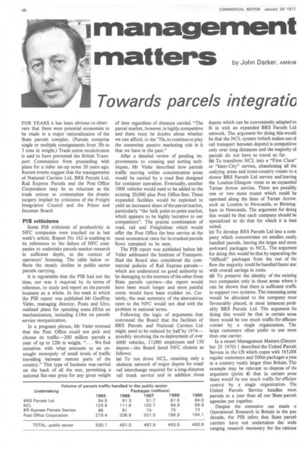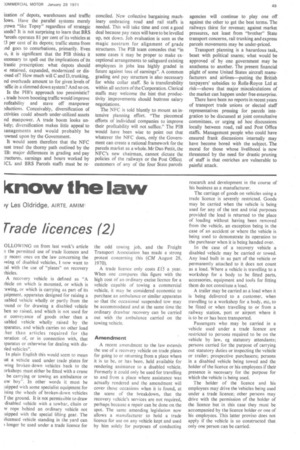'management
Page 50

Page 51

If you've noticed an error in this article please click here to report it so we can fix it.
matters by John Darker AMB M
Towards parcels integratio
FOR YEARS it has been obvious to observers that there were potential economies to be made in a major rationalization of the State parcels complex. (Parcels comprise single or multiple consignments from 3Ib to 3 tons in weight.) Trade union recalcitrance is said to have prevented the British Transport Commission from proceeding with plans for a tidier set-up some 20 years ago. Recent events suggest that the managements of National Carriers Ltd, BRS Parcels Ltd, Rail Express Parcels and the Post Office Corporation may be as reluctant as the trade unions to contemplate the drastic surgery implied by criticisms of the Freight Integration Council and the Prices and Incomes Board.
PIB criticisms
Some PIB criticisms of productivity in NFC companies were touched on in last week's article. Report No 162 is scathing in its references to the failure of NFC companies to undertake parcels market research in sufficient depth, in the context of operators' licensing. The table below reflects the steady decline in public sector parcels carrying.
It is regrettable that the PIB had not the time, nor was it required by its terms of reference, to study and report on the parcels business as a whole. In the week in which the PIB report was published Mr Geoffrey Vieler, managing director, Posts and Giro, outlined plans for spending some £83m on mechanization, including £18m on parcels service reorganization.
In a pregnant phrase, Mr Vieler stressed that the Post Office could not pick and choose its traffic-200 million parcels a year of up to 221b in weight. ". . . We find ourselves with what amounts to an unsought monopoly of small levels of traffic travelling between remote parts of the country." This type of business was carried on the back of all the rest, permitting a national flat-rate price for any given weight of item regardless of distance carried. "The parcel market, however, is highly competitive and there must be doubts about whether we can afford, in the '70s, to continue to play the somewhat passive marketing role in it that we have in the past."
After a detailed review of pending improvements to routeing and sorting techniques, Mr Vieler described how parcels traffic moving within concentration areas would be carried by a road fleet designed for container operation. Eventually, another 1000 vehicles would need to be added to the existing 20,000 plus Post Office fleet. These expanded facilities would be exploited to yield an increased share of the parcel market, particularly "the bulk point-to-point market, which appears to be highly lucrative to our competitors". The precise combination of road, rail and Freightliner which would offer the Post Office the best service at the most economical rates for its trunked parcels flows remained to be seen.
The PIB report was published before Mr Veiler addressed the Institute of Transport. Had the Board also considered the commercial policies of Rail Express parcels— which are understood on good authority to be damaging to the interests of the other three State parcels carriers—the report would have been much longer and more painful corns would have been trodden on. Certainly, the neat summary of the alternatives open to the NFC would not deal with the problem in national terms.
Following the logic of arguments that convinced the Board that the facilities of BRS Parcels and National Carriers Ltd might need to be reduced by half by 1974— possibly involving the re-deployment of over 6000 vehicles, 17,000 employees and 150 depots—the Board listed NFC choices as follows: (a) To run down NCL, retaining only a skeleton network of major depots for road/ rail interchange required for a long-distance rail trunk service and in addition those depots which can be conveniently adapted to fit in with an expanded BRS Parcels Ltd network. The argument for doing this would be that the NCL system (which makes use of rail transport between depots) is competitive only over long distances and the majority of parcels do not have to travel so far.
(b) To transform NCL into a "First Class" or "Inter-City" service, abandoning all the outlying areas and cross-country routes to a slower BRS Parcels Ltd service and leaving the London-Glasgow route to an expanded Tartan Arrow service. There are possibly one or two more routes which could be operated along the lines of Tartan Arrow, such as London to Newcastle, or Birmingham to Newcastle. The argument for doing this would be that each company should be specialized to do that for which it is best suited.
(c) To develop BRS Parcels Ltd into a company which concentrates on smaller, easily handled parcels, leaving the larger and more awkward packages to NCL. The argument for doing this would be that by separating the "difficult" packages from the rest of the flow the majority could be handled faster ark with overall savings in costs.
(d) To preserve the identity of the existing two companies only in those areas where it can be shown that there is sufficient traffic to support two systems. The remaining area: would be allocated to the company mos: favourably placed, in most instances probably BRS Parcels Ltd. The argument foi doing this would be that in certain area: there would be too much traffic for efficien: contiol by a single organization. The large customers often prefer to use more than one carrier.
In a recent Management Matters (Decem ber 25 1970) I described the United Parcel: Service in the US which copes with 165,00( regular customers and 500m packages a yea: in a country vastly larger than Britain. Thi: example may be relevant to dispose of the argument (point d) that in certain area: there would be too much traffic for efficierr control by a single organization. The United Parcels Service handles more parcels in a year than all our State parcel; agencies put together.
Despite the extensive use made o Operational Research in Britain in the pas decade, the PIB infers that State parcel: carriers have not undertaken the wide ranging research necessary for the rationa
ization of depots, warehouses and traffic lows. Have the parallel systems merely ;rown "like Topsy" regardless of strategic ieeds? It is not surprising to learn that BRS 3arcels operates 81 per cent of its vehicles at !3 per cent of its depots; traffic stems from aid goes to conurbations, primarily. Even o, it is significant that the PIB thinks it iecessary to spell out the implications of its lrastic prescription: what depots should ie retained, expanded, modernized or disosed of? How much will C and D, trunking, nd overheads amount to for given levels of .affic in a slimmed down system? And so on.
Is the NB's approach too pessimistic?
trade boom boosting traffic would improve rofitability and stave off manpower aductions. Conceivably, diversification of ctivities could absorb under-utilized assets nd manpower. A trade boom looks unkely; diversification makes little appeal to ianagements and would probably be -owned upon by the Government.
It would seem therefore that the NFC lust tread the thorny path outlined by the 113: major differences in grading and pay tructures, earnings and hours worked by ICL and BRS Parcels staffs must be re
conciled. New collective bargaining machinery embracing road and rail staffs is needed. This will take time and cost a good deal because pay rates will have to be levelled up, not down. Job evaluation is seen as the magic nostrum for alignment of grade structures. The PIB team concedes that "in some cases it may be proper to make exceptional arrangements to safeguard existing employees in jobs less highly graded in future against loss of earnings". A common grading and pay structure is also necessary for white collar staff. So is transferability within all sectors of the Corporation. Clerical staffs may welcome the hint that productivity improvements should buttress salary negotiations.
The NFC is told bluntly to mount an intensive planning effort. "The piecemeal efforts of individual companies to improve their profitability will not suffice." The PIB would have been wise to point out that whatever the NEC does, only the Government can create a rational framework for the parcels market as a whole. Mr Dan Pettit, the NFC's new chairman, cannot dictate the policies of the railways or the Post Office; customers of any of the four State parcels agencies will continue to play one off against the other to get the best terms. The railways thirst for revenue; against market pressures, not least from "brother" State transport concerns, rail trunking and express parcels movements may be under-priced.
Transport planning is a hazardous task, beset with political snares; what would be approved of by one government may be anathema to another. The present financial plight of some United States aircraft manufacturers and airlines—putting the British taxpayers' subsidies to Rolls-Royce Ltd at risk—shows that major miscalculations of the market can happen under free enterprise.
There have been no reports in recent years of transport trade unions or elected staff representatives pressing for parcels integration to be discussed at joint consultative committees, or urging ad hoc discussions locally between road, rail and Post Office staffs. Management people who could have ensured frank discussions internally may have become bored with the subject. The moral for those whose livelihood is now threatened by the need for drastic pruning of staff is that ostriches are vulnerable to painful attack.




























































































